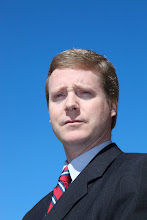Water is wet. The sky is blue. Europe is cowardly.
While all three are indisputable, only the last can change. But it will take sheer will and an enormous amount of courage to turn around a continent falling apart, not from outside invasion, but from within. Their death spiral is a direct result of leaders who prostrate themselves before the altar of political correctness --- and a people too reluctant or scared to challenge them.
A perfect example of is playing out right now. Despite brutal acts of piracy occurring off Eastern Africa on a daily basis --- affecting European ships, and by extension, Europeans themselves --- political and media elites have been demonizing 79-year old Norwegian shipping magnate Jacob Stolt-Nielsen. Why? Because in an op-ed, he had the guts to advocate the only realistic way to deal with these terrorists on the high seas: sink their ships with the pirates in them, or execute them on the spot.
So what’s the problem with that?
*****
“You wanna know how to get Capone?”, Sean Connery’s character asks Elliot Ness in The Untouchables. “They pull a knife, you pull a gun. He sends one of yours to the hospital, you send one of his to the morgue. That's the Chicago way! And that's how you get Capone.”
And you know what? They got Capone.
It’s expected that Europe doesn’t have the courage to do things The Chicago Way. That’s why they need America to bail them out time and again.
Unfortunately, that immutable lesson has now also been lost on America’s leaders, replaced by softness, complacency and the desire not to offend.
And our enemies have exploited that weakness, as al-Queda can proudly attest.
It’s also why we are routinely losing to pirates operating from the rogue nation of Somalia. Not content with the hundreds of millions they’ve already extorted, they violently hijack about one ship per day, and are currently holding 700 hostages and 30 ships for ransom.
And we’re not talking about just pleasure craft or fishing vessels, but huge ships supplying the world with cargo, food, oil --- and weapons. Two years ago, a supertanker larger than an aircraft carrier was hijacked as it was transporting more than $100 million worth of crude oil. When that happens, we all pay for it at the pump.
And given the pirates’ cozy relationship with Islamic fundamentalists, some of that ransom money is making its way right into the hands of terrorists hell bent on destroying the West.
These barbarians turned it up a notch this week, killing four Americans after hijacking their private vessel. But here’s the most disturbing part: despite being closely monitored by four U.S. Navy warships, they executed the hostages anyway. That level of arrogance tells all we need to know: they don’t fear us.
And no wonder. Our “tough” response will be to haul the captured pirates into U.S. courts on the other side of the world, where they will receive first-class taxpayer-funded defense lawyers and free health care. How nice.
And that’s supposed to deter more attacks?
Manhattan prosecutors don’t make Somali-based pirates tremble, a fact not lost on Stolt-Nielsen. As one of the few who lives in the real world, he stated how to end the unchecked piracy:
“When (piracy) implies a great risk of being caught and hanged, and the cost of losing ships and weapons becomes too big, it will decrease and eventually disappear.”
To that point, he ridicules the American and European “solution” to dealing with problem. (We should) “…not arrest them and say, 'naughty, naughty, shame on you,' and release them again, but sink their boats with all hands…the pirates won't be frightened by being placed before a civilian court."
Yet the response from those who bury their head in the sand? Killing pirates would be “barbaric,” with opponents arguing that, despite documented torture, abuse and murder of their captives, these rogues must be treated with basic human rights.
Kind of like the human rights given to the murdered Americans and tortured sailors? Of course not, since the real victims are always forsaken by bleeding hearts.
Pirates have those rights before they hijack ships. Once they cross the line, however, all bets are off. Ships should carry armed guards, who, upon attack, should exercise no restraint in vaporizing the marauders. The goal should not be to deter, but to destroy, for three reasons. First, it is now just as likely pirates will execute the crew once aboard; second, letting them go will only make another ship’s crew their victim; third, it will send a clear, unmistakable message that there is a new Law Of The Sea. It’s called The Chicago Way.
Let’s be very clear about what will happen. When 10 pirates go out, only to return as corpses floating up on the beach resorts of Somalia, there will be a paradigm shift in how the remaining pirates will conduct their business. Translation: they’ll find a different profession. Immediately.
Stolt-Nielsen said it best when he referenced why piracy declined over the last several hundred years. "Pirates captured in international waters have always been punished by death, often on the spot."
Here’s standing with Stolt-Nielsen in dropping the empty threats, picking up the guns, sinking ships and killing the barbarians. They can have their day in court --- in Davy Jones’ locker.
Chris Freind is an independent columnist, television commentator, and investigative
reporter who operates his own news bureau, www.FreindlyFireZone.com
Readers of his column, “Freindly Fire,” hail from six continents, thirty countries
and all fifty states. His work has been referenced in numerous publications including
The Wall Street Journal, National Review Online, foreign newspapers, and in Dick
Morris' recent bestseller "Catastrophe."
Freind, whose column appears regularly in Philadelphia Magazine and nationally in
Newsmax, also serves as a frequent guest commentator on talk radio and state/national
television, most notably on FOX Philadelphia. He can be reached at CF@FreindlyFireZone.com
